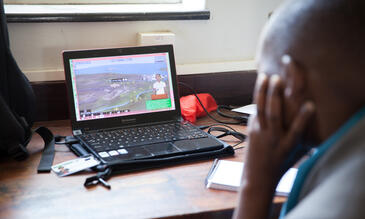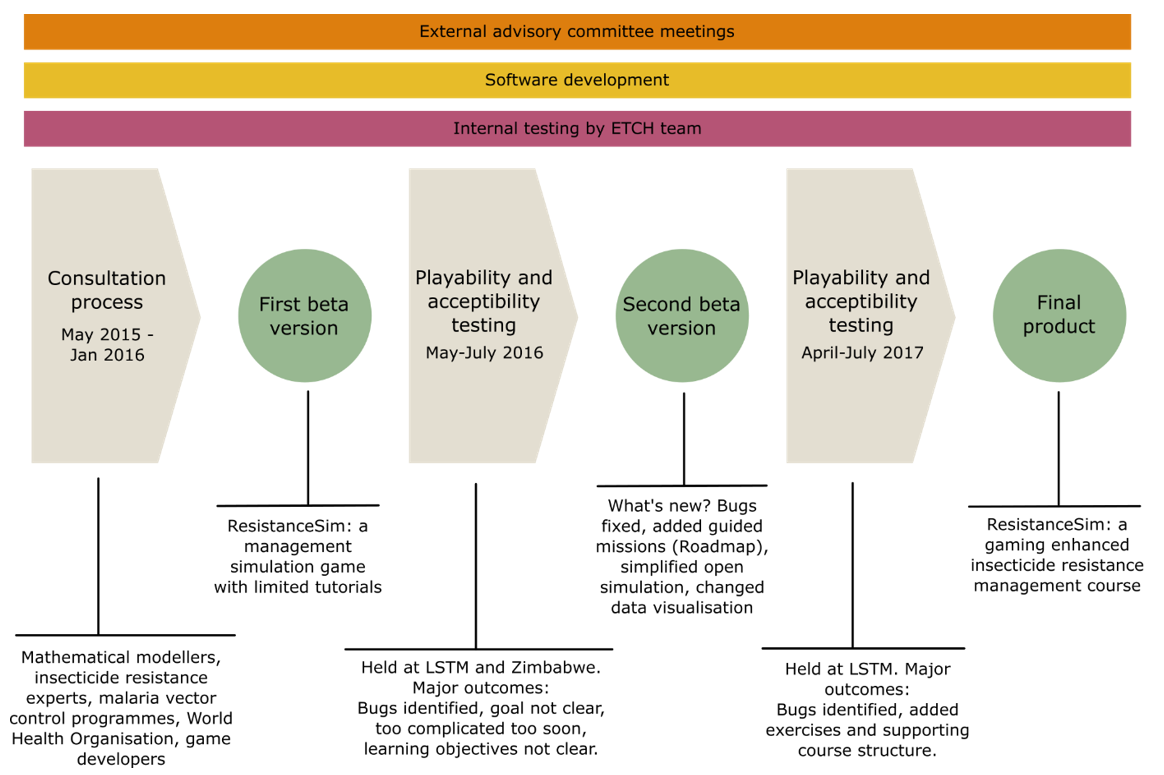
Insecticide resistance poses a significant threat to vector control efforts. However, there are proven insecticide resistance management (IRM) strategies that a programme can use to slow the spread and prevent the emergence of insecticide resistance. The ResistanceSim project is a three-year game development and acceptability study, exploring the potential use of digital gaming to increase knowledge about insecticide resistance management within malaria control programmes.
Objectives
- Identify the current challenges in implementing IRM strategies and evaluate how they can be addressed using serious games
- Develop a digital game to allow users to explore IRM and its impact on vector control
- Assess the feasibility (demand and acceptability) of the digital game within sub-Saharan Africa
Project Activities
Stakeholder workshops
|
Two workshops were held early in the ResistanceSim development process. The first was held over two days in May 2015 with the primary aims to discuss and determine 1) the learning objectives that would be incorporated into the game specification, 2) the value and potential use of current mathematical models to support learning objectives, and 3) game design and scenario options to best support the learning objectives. The second workshop was held over two days in January 2016. The objective of this workshop was to define the preferred rollout strategy for the game, including how to make the game available and how it should be used. Participants at these workshop included representatives from malaria control programmes in sub-Saharan Africa and Southeast Asia, mathematical modellers from four academic institutions, potential funding partners, members of the Engaging Tools for Communication in Health (ETCH) team at the Liverpool School of Tropical Medicine (LSTM), and representatives from the World Health Organisation (WHO). |
 |
Acceptability testing
Routine testing was conducted throughout the development of ResistanceSim by the ETCH team. Playability testing with external users was performed four times coinciding with major development milestones. The primary objective of these testing sessions was to identify bugs and usability issues. However, if the testers were members of the target audience, a secondary objective was to assess acceptability as a learning tool.

Figure 1. The processes involved in the development of ResistanceSim. Ongoing activities are indicated in the three boxes at the top.
Project Outputs
Scientific publications:
ResistanceSim: development and acceptability study of a serious game to improve understanding of insecticide resistance management in vector control programmes, Malaria Journal 2018 17:422
Links to download game and course material coming soon.
Next Steps
An acredited gaming enhanced insecticide resistance management course is currently in development. Please contact etch@lstmed.ac.uk to learn more about this exciting project.
Partners and Collaborators
Development of ResistanceSim was completed by LSTM and EM studios. Many organisations contributed to initial design ideas, including the WHO, University of Notre Dame, Research Institute for Tropical Medicine in the Philippines, AngloGold Ashanti, Abt Associates, Swiss Tropical and Public Health Institute, Witswatersrand University, Ministries of Health in Zambia and Ghana, Intellectual Ventures Laboratory, Nigeria Institute for Medical Research, and Universty of Abomey-Calavi in Benin.
Funders
ResistanceSim was funded by the Bill and Melinda Gates Foundation through the IVCC.
